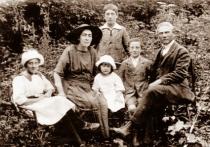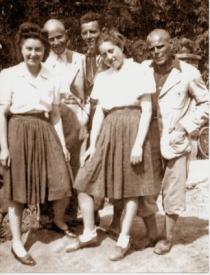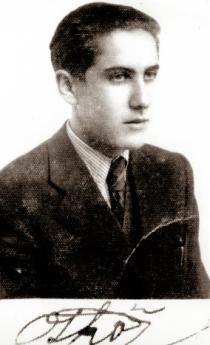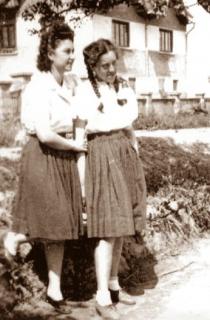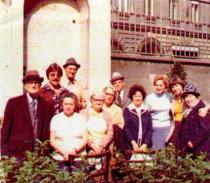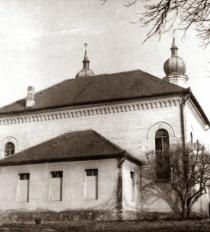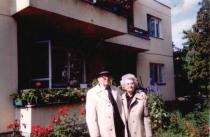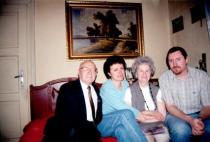This is a photo of my family, taken in 1923, in Covasna: in it you can see my father, Solomon Lowi, he is the first from right; near him there is my brother Francisc, and behind Francisc there is my brother Emil. The woman with the hat is my mother, Eszter Lowi, and next to her on the left is my elder sister, Livia. I am the kid in the white dress, in the middle. My father wanted to have this photo taken and send it to his brother in Hungary, Ignac, whom he loved very much and to whom he wrote very often. He wanted to show him his family.
My father was a wood engineer. At first he was manager of a brick and terracotta tiles factory, which was built by Armin, my father's brother, who was an expert in construction materials and in timber: Armin handed over the factory, which sold terracotta stoves, to my father. The factory was on my father's name. In Cluj, at the Chamber of Commerce and Industry, my father's name, Solomon Lowi, is written in the books as the owner of the factory. My parents didn't live in the city of Cluj, but in Kajántó, which was close; but they had a coach with horses, and somebody to drive it, and they went in the city very often. My sister, Livia, was born in Cluj in 1912. But after my father was drafted for Word War I, he eventually lost the factory there because he couldn’t recover the losses, so he went to Covasna and became the director of the Groedl factory. When my parents moved to Covasna, my maternal grandparents came to live with them there. My brother Francisc was born in Covasna in 1914, while my parents were in Covasna.
The owner of the timber factory where my father worked was an Austrian baronet, Groedl, who was a Jew as well. Actually they were a family of baronets, they were a few brothers, and they owned the forests and the factories in Comandau and Covasna. At Comandau, the merchandise was brought from the forest and it was processed, timber was made from the cut trees. The factory in Covasna was for storage and selling of the merchandise, it was like a shipping station: the timber came as merchandise and from the sale point it was sent to different countries. It was a big factory, the biggest timber factory in all Covasna county. My father only worked there, at the factory in Covasna.
We weren’t extremely religious. My father knew some Hebrew I think, but my mother didn't, she could only read. She learnt to read the prayers, but I think my father went to cheder as a child and he could understand it as well. They weren't involved in the Jewish community in Covasna. My mother observed the tradition at home, although my father worked on Saturdays: she lit a candle on Sabbath, she recited the prayer. There was no work done on Saturdays, or on Sundays as a matter of fact: not even the servant was allowed to work. My mother didn't cook kosher food, but every time she got to Brasov, she bought kosher food from there. There was no synagogue in Covasna where we could go on Sabbath. So on the high holidays all the Jews in Covasna gathered in a room of the factory my father worked for, which was some sort of a club for them; and I know a Jew from Debrecen came, who knew the prayers and who led the ceremonies. All our family fasted on Yom Kippur and we children fasted as well when we turned 10 years old. I know mother cooked humentaschen on Purim, but dressing up wasn't popular in Covasna. We always celebrated Christmas as well.

